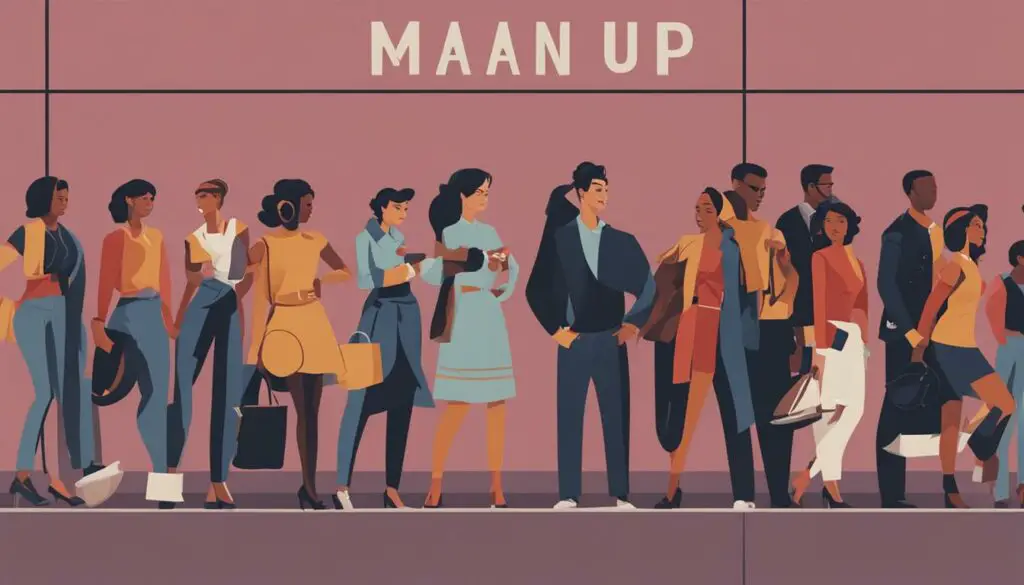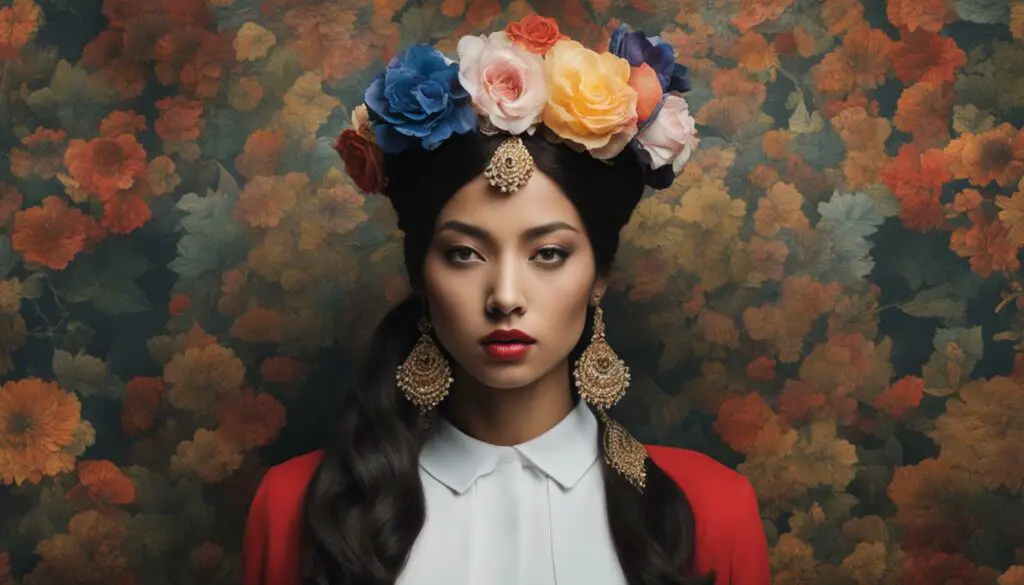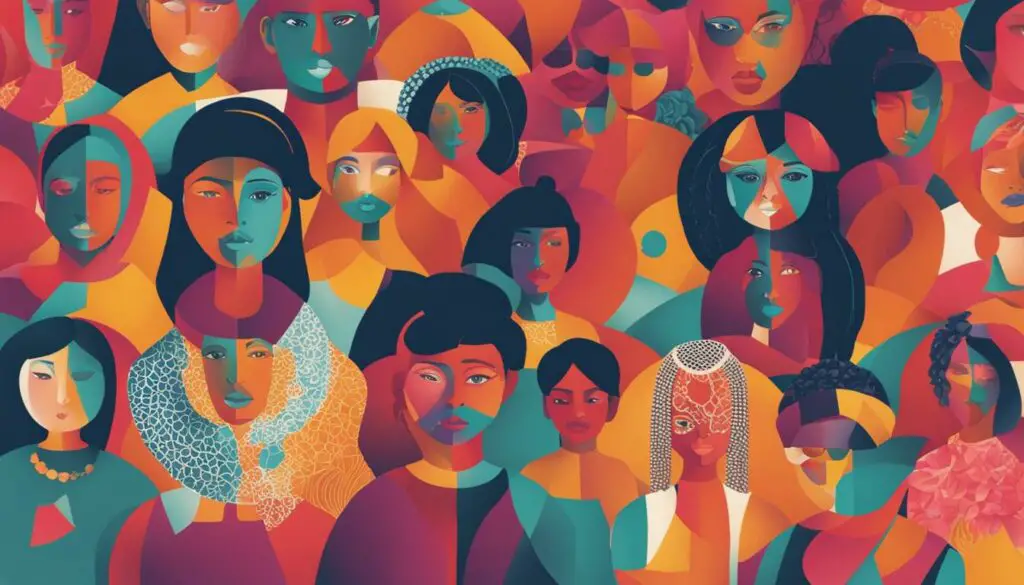Language is a powerful tool that shapes our perceptions of the world around us. It can reflect and perpetuate societal norms, including gender biases that often go unnoticed. In this article, we will delve into the question of whether the phrase “Luck Be a Lady” is sexist. We will explore the concept of gender bias in common phrases and examine the implications it has on popular culture. By taking a feminist perspective, we aim to analyze the underlying sexism and promote a greater understanding of gender representation.
Key Takeaways:
- The language we use can perpetuate gender biases and reinforce traditional gender roles.
- The phrase “Luck Be a Lady” is commonly used but may have underlying sexist implications.
- Analyzing language and its impact on gender representation can promote greater understanding and inclusivity.
- Taking a feminist perspective can help identify problematic language and promote social change.
- Promoting inclusive language can contribute to a more equitable and empowered society.
Understanding Luck Be A Lady Tonight

To fully explore the potential gender biases within the phrase “Luck Be a Lady,” we must first understand its origins and cultural significance. Originally written by Frank Loesser in 1950, the song was made famous by the musical Guys and Dolls, which debuted on Broadway in 1950.
“Luck Be a Lady” represents a gambler’s plea to Lady Luck, asking for her assistance in a high-stakes game. The lyrics convey a sense of desperation, as the gambler pleads for a winning hand. However, the phrase “Luck Be a Lady” has transcended its original context and become a common idiom used in everyday conversation.
Despite its widespread use, the phrase’s meaning and implications may not be immediately clear. By analyzing the lyrics and its portrayal in entertainment, we can begin to uncover any potential gender biases and question whether the use of gendered language in common phrases perpetuates harmful gender stereotypes.
While the phrase may not appear overtly sexist at first glance, it is important to consider the larger context in which it is used. By examining the underlying assumptions and implications of phrases like “Luck Be a Lady,” we can promote a greater understanding of gender representation in language and work towards a more equitable society.
Analyzing Gender Bias in Luck Be A Lady

In this section, we will examine the lyrics of “Luck Be a Lady” and analyze the potential gender bias present within them. It is important to consider the impact that these lyrics may have on perpetuating harmful gender stereotypes and reinforcing inequality.
“A lady doesn’t wander all over the room And blow on some other guy’s dice”
Here, the use of the term “lady” suggests a certain standard of behavior that women are expected to adhere to. The implication is that women should be demure and stay in one place, rather than engaging in the same activities as men. This reinforces the idea that women are inferior to men and should not have the same freedoms or opportunities.
“She’s a lady, she’s smart, but not a smarty”
The use of the phrase “not a smarty” suggests that intelligence is not a desirable trait for a woman to possess. This reinforces harmful stereotypes that women should be subservient to men and not challenge their authority or intelligence.
“A lady never leaves her escort, it isn’t fair, it isn’t nice”
The notion that a woman should never leave her escort reinforces the idea that women are dependent on men and should not be independent. It suggests that women should not have the agency to make their own decisions or follow their own desires. This perpetuates harmful gender roles and reinforces inequality.
By examining these examples, we can see how subtle gender biases can be perpetuated through popular culture. It is important to analyze these biases and work towards promoting more inclusive language, being mindful of the potential implications of the language we use.
The Feminist Perspective on Luck Be A Lady
From a feminist perspective, the gender bias present in phrases like “Luck Be a Lady” is concerning. It reinforces limiting gender roles and perpetuates a culture of sexism. While some might argue that the phrase is harmless, we must consider the wider social implications and the impact on individuals.
Language is a powerful tool that shapes our attitudes and perceptions. When gender bias is present in common phrases and expressions, it can result in harmful stereotypes and reinforce unequal power dynamics.
“Luck Be a Lady” is an example of how patriarchal structures are woven into the fabric of our language and culture. It reinforces the idea that women exist only to please men and rely on their luck for success.”
Women have historically faced discrimination and inequality in all areas of life, including language. Phrases like “Luck Be a Lady” perpetuate the idea that women are objects to be won or lost and contribute to a culture that devalues women’s abilities.
It is important to remember that language is not neutral. The words we use can have a significant impact on how we view ourselves and others. By challenging gender biases in our language, we can work towards a more equitable and inclusive society.
By promoting a feminist perspective, we can begin to recognize the insidious forms of sexism present in common phrases and work towards creating a more equal and just society. It is important to critically evaluate our language and challenge harmful stereotypes and biases.
Debunking Misconceptions about “Luck Be A Lady”

Despite the popularity of the phrase “Luck Be a Lady,” some may argue that it is not necessarily sexist. However, this argument fails to recognize the gender bias ingrained in common phrases and the impact that it has on reinforcing gender inequality.
One common misconception is that these phrases are harmless and should not be taken seriously. However, this dismisses the impact of language on shaping societal attitudes and perpetuating harmful gender stereotypes. It is important to recognize the power of language and its ability to reinforce or challenge gender bias.
“It is important to recognize the power of language and its ability to reinforce or challenge gender bias.”
Another argument is that phrases like “Luck Be a Lady” are simply part of traditional culture and should not be changed. However, tradition should not be used as an excuse to perpetuate harmful ideas. Instead, we should strive to identify and challenge biases in all aspects of culture, including language.
Finally, some may argue that there are more pressing issues facing women than gender bias in language. However, the impact of gender bias in phrases extends beyond language alone and contributes to a larger culture of misogyny. By challenging these biases, we can work towards a more equitable society for all individuals.
As we continue to explore the impact of language on gender representation, it is essential to address these misconceptions and promote a more nuanced understanding of gender bias in popular culture.
The Impact of Sexist Phrases in Popular Culture

Sexist phrases like “Luck Be a Lady” can have a harmful impact on society, affecting how women are perceived and represented. In popular culture, such phrases reinforce traditional gender roles and perpetuate harmful stereotypes. This can lead to a culture that devalues women’s abilities and undermines their potential.
Furthermore, sexist phrases can have a diminishing effect on female empowerment. When women are constantly bombarded with language that reinforces their supposed inferiority, it can be difficult to feel confident and assertive. As a result, women may be less likely to pursue opportunities or speak up for themselves, perpetuating a cycle of gender inequality.
The Importance of Inclusive Language
It is crucial to promote more inclusive language in popular culture. By choosing words and phrases that reflect gender equality and diversity, we can help create a society that values and uplifts all individuals. Inclusive language can also have a positive impact on self-esteem and empowerment, encouraging women and other marginalized groups to pursue their goals and aspirations.
Challenging Gender Bias in Popular Culture
One way to challenge gender bias in popular culture is to actively speak out against sexist phrases and stereotypes. This can be done through activism, education, and media representation. By promoting diverse perspectives and highlighting the harm caused by gender bias, we can work towards a more equitable and inclusive society.
Another strategy is to actively seek out and support media and entertainment that promotes gender equality. This can include films, TV shows, and music that feature strong female leads and inclusive language. By supporting these forms of media, we can help create a culture that values and empowers women.
Challenging Gender Bias in Language

Language is a powerful tool, and the words we use can have a significant impact on how we view ourselves and others. Unfortunately, many common phrases contain implicit gender bias that reinforces harmful stereotypes and perpetuates inequality.
As individuals, we have the power to challenge and overcome gender bias in language. By choosing inclusive and empowering language, we can work towards a more equitable and just society. Here are some strategies to consider:
- Awareness: The first step in challenging gender bias is to become aware of the language we use. Take a moment to reflect on the words and phrases you typically use, and consider how they may reinforce gender stereotypes. This increased awareness can help you make more conscious choices about the language you use.
- Inclusive language: When speaking or writing, try to use inclusive language that avoids assumptions about gender roles or identities. For example, instead of using “he” or “she,” use “they” or “them” when referring to individuals of unknown or non-binary gender. This not only promotes gender equality but also recognizes the diversity of human experiences.
- Critical thinking: Challenge common phrases and stereotypes by thinking critically about their underlying assumptions. Ask yourself if you are perpetuating harmful gender biases, and consider alternative language choices that empower individuals of all genders.
- Feminist perspective: Adopting a feminist perspective means recognizing the impact that gender bias has on society and actively working to challenge it. By considering the ways in which language reinforces inequality, we can promote more inclusive and empowering language choices.
- Be an ally: As an ally, you can support individuals who are impacted by gender bias in language. This may involve advocating for more inclusive language in educational or professional settings, or simply challenging harmful language when you hear it.
Challenging gender bias in language is an ongoing process, but it is a vital step towards building a more just and equitable society. By raising awareness, promoting inclusive language, and encouraging critical thinking, we can work towards a world where individuals of all genders are valued and empowered.
Examining Other Problematic Phrases

While “Luck Be a Lady” is just one example of a potentially sexist phrase, there are many others that perpetuate gender bias and misogyny. For example, phrases like “man up” and “throw like a girl” reinforce harmful stereotypes and contribute to a culture that devalues women’s abilities.
It’s important to recognize the negative impact of these phrases and actively work toward eliminating them from our language. By challenging these expressions and promoting more inclusive language, we can create a more equitable society that values all genders equally.
The origins of these phrases often stem from a historically patriarchal society. For example, the phrase “rule of thumb,” which is commonly used to mean a general guideline, originates from an old English law that allowed men to beat their wives with a stick no wider than their thumb. These subtle ties to misogyny and gender bias are pervasive in our language and require active effort to overcome.
Examples of Problematic Phrases:
| Phrase | Implication |
|---|---|
| Man up | Suggests that being emotional or vulnerable is weak and unmanly. |
| Like a girl | Implies that doing something “like a girl” is inferior or weak. |
| Boys will be boys | Excuses inappropriate behavior or actions based on gender. |
By examining these problematic phrases and actively working to remove them from our language, we can promote more inclusive and respectful communication. It’s up to each of us to be conscious of our language choices and to challenge gender bias whenever we encounter it.
The Importance of Gender Representation

When it comes to challenging gender bias and promoting gender equality, the representation of gender in language is crucial. By using inclusive language and avoiding stereotypes, we can create a more inclusive and equitable society.
One study found that gender-neutral language in job advertisements resulted in a more diverse pool of candidates, indicating the impact that language can have on promoting equal opportunities.
Gender representation is also important in popular culture, where media can shape our perceptions of gender roles and identities. By showcasing diverse representations of gender, we can challenge harmful stereotypes and celebrate the complexity of human experiences.
Ultimately, promoting gender representation in language is about recognizing the inherent value and dignity of all individuals, regardless of gender. By using language to empower and uplift individuals, we can work towards a more just and inclusive world.
Overcoming Gender Bias in Phrases
Gender bias in language persists as a significant challenge in promoting gender equality. Whether in personal or professional settings, our choice of words can shape attitudes and reinforce harmful stereotypes. However, there are practical steps we can take to overcome gender bias in phrases and promote inclusivity.
Educate Yourself
A crucial first step in overcoming gender bias is to educate yourself on the issue. By familiarizing yourself with different perspectives and experiences, you can gain a better understanding of the harm caused by problematic language. Reading feminist literature and engaging in conversations with people from diverse backgrounds can provide valuable insights and promote critical thinking.
Promote Feminist Language
Promoting feminist language is a vital strategy for challenging gender bias in phrases. This involves using gender-neutral terms and avoiding language that reinforces gender stereotypes or perpetuates harmful ideas. For example, using phrases like “them” or “they” instead of “he” or “she” can promote inclusivity and avoid assumptions about gender identity.
Challenge Biased Language
When you encounter biased language, it’s essential to challenge it. This can involve speaking up in conversations or advocating for change in professional settings. By highlighting the harm caused by gender bias in language, you can contribute to a greater cultural shift towards inclusivity.
Embrace Diversity
Embracing diversity is a crucial aspect of promoting inclusivity in language. By using language that acknowledges and celebrates differences, we can create a more welcoming and equitable society. For example, using terms like “partner” instead of “husband” or “wife” can avoid assumptions about gender and promote inclusivity for people in non-traditional relationships.
The Role of Language Evolution
Language is a dynamic and ever-changing entity, influenced by various social and cultural factors. Over time, linguistic shifts have reflected shifts in societal norms, including gender representation and the move towards greater inclusivity.
As we have explored in this article, language can both reflect and perpetuate gender bias in phrases, perpetuating harmful stereotypes and societal inequalities. However, language also has the potential to evolve and challenge these biases, paving the way towards greater gender equality.
From a feminist perspective, language evolution must be driven by a commitment to inclusivity and the promotion of diverse gender representations. This includes challenging traditional gender roles and exploring new ways of expressing gender identity.
As we continue to examine the impact of sexism in popular culture, it is essential to consider the role of language in shaping societal attitudes. By embracing language evolution and promoting gender representation, we can work towards a more equitable and inclusive society.
Conclusion
Gender bias in language is a pervasive issue that reinforces harmful stereotypes and perpetuates inequality. Our examination of whether “Luck Be a Lady” is sexist has uncovered the complexities of this issue, highlighting the need for increased awareness and action. By taking a feminist perspective, we have analyzed the cultural, social, and linguistic implications of gender bias in phrases, promoting a more nuanced understanding.
Challenging Gender Bias
Individuals can play an active role in challenging gender bias in language by promoting inclusive language choices. This can include using gender-neutral terms, avoiding harmful stereotypes and slurs, and educating others about the impact of language. By raising awareness and encouraging critical thinking, we can work towards a more equitable society that values diversity and promotes gender equality.
The Importance of Representation
Representation matters. By promoting diverse portrayals of gender in language, we can challenge harmful stereotypes and empower individuals who have been historically marginalized. Inclusive language choices can help to promote positive attitudes and dismantle harmful social norms. By highlighting positive examples and discussing the benefits of representation, we can work towards a more inclusive and equitable society.
The Role of Language Evolution
Language is a dynamic and evolving entity. As social norms and values continue to shift, so too must our language. By examining historical shifts in language and the impact of linguistic changes on societal norms, we can explore how language can be reshaped to challenge gender biases. This highlights the potential for language evolution as a means to combat gender bias and promote gender equality.
Overall, our analysis of “Luck Be a Lady” underscores the importance of language in shaping societal attitudes towards gender. By challenging gender bias in language and promoting inclusive language choices, we can contribute to a society that values diversity and empowers all individuals.
FAQ
Is “Luck Be a Lady” a sexist phrase?
The phrase “Luck Be a Lady” can be seen as perpetuating gender bias, as it implies that luck is inherently associated with femininity. While it may not be intentionally sexist, it reinforces traditional gender roles and can contribute to the larger culture of misogyny.
What is the origin of the phrase “Luck Be a Lady”?
The phrase “Luck Be a Lady” originated from the song “Luck Be a Lady Tonight” written by Frank Loesser for the musical Guys and Dolls in 1950. It has since become a popular expression used to wish someone good luck.
How does the phrase “Luck Be a Lady” contribute to sexism in popular culture?
The phrase “Luck Be a Lady” contributes to sexism in popular culture by reinforcing gender stereotypes and perpetuating the idea that women rely on luck instead of their own abilities. This can undermine women’s achievements and contribute to a culture that devalues their capabilities.
Does analyzing the phrase “Luck Be a Lady” from a feminist perspective change its meaning?
Analyzing the phrase “Luck Be a Lady” from a feminist perspective allows us to understand the underlying gender biases and the potential harm caused by such phrases. It prompts us to question and challenge the traditional roles and expectations assigned to women in society.
Are there any misconceptions about the phrase “Luck Be a Lady” that need to be debunked?
One common misconception is that the phrase is harmless and merely a figure of speech. However, it is essential to recognize that language shapes our perceptions and can perpetuate harmful stereotypes. By examining the phrase critically, we can create a more inclusive and equitable society.
How do sexist phrases like “Luck Be a Lady” impact gender representation?
Sexist phrases like “Luck Be a Lady” contribute to a lack of diverse gender representation by reinforcing traditional gender roles and limiting the portrayal of women’s abilities. This can hinder progress toward gender equality and discourage the empowerment of women in various spheres of life.
What can individuals do to challenge gender bias in phrases like “Luck Be a Lady”?
Individuals can challenge gender bias in phrases by raising awareness, promoting inclusive language, and actively challenging sexist expressions. By using language that values all genders equally, we can contribute to a more inclusive and respectful society.
Are there other phrases similar to “Luck Be a Lady” that perpetuate gender bias?
Yes, there are several other phrases and expressions that perpetuate gender bias and contribute to a culture of misogyny. Examples include “boys will be boys,” “man up,” and “throw like a girl.” These phrases reinforce harmful stereotypes and limit gender representation.
Why is gender representation important in language?
Gender representation in language is essential because it shapes societal attitudes and perceptions. By using inclusive language and representing diverse genders, we can challenge traditional gender roles and foster a more equitable and inclusive society.
What practical steps can individuals take to overcome gender bias in phrases?
Individuals can overcome gender bias in phrases by educating themselves about inclusive language, challenging their own biases, and advocating for inclusive language use in personal and professional settings. By being conscious of the language we use, we can contribute to a more equal society.
Can language evolution help combat gender bias in phrases like “Luck Be a Lady”?
Yes, language evolution can play a crucial role in combating gender bias in phrases. As society progresses and becomes more aware of gender equality, language can adapt to reflect these changes. By reshaping language, we can challenge sexist expressions and promote a more inclusive language environment.

